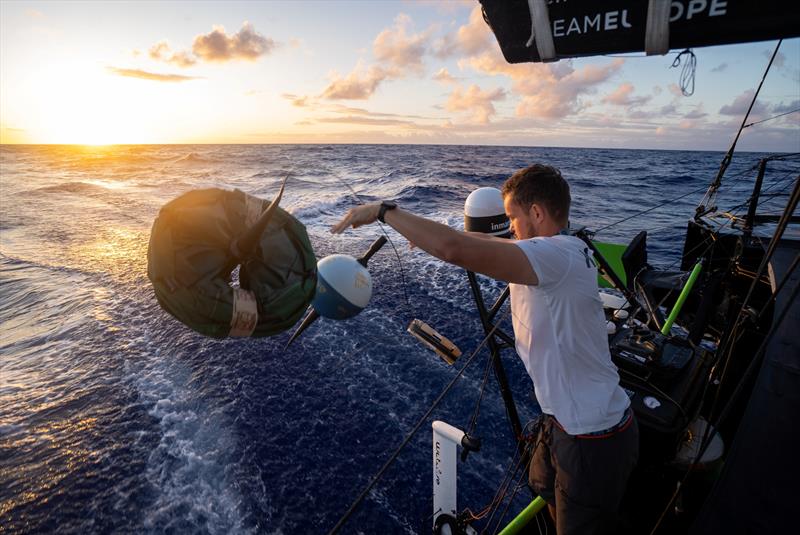
The Ocean Race Europe teams will contribute ocean data to international science while racing
by The Ocean Race 11 Jun 22:09 HKT

Teams deploy drifter buoys to collect science data © Charles Drapeau / GUYOT environnement Team Europe / The Ocean Race
The Ocean Race Europe, an offshore sailing race that connects seven European cities from the Baltic to the Adriatic Seas will see all of the competing IMOCA race boats carrying specialised science equipment.
During the race this summer, the sailors on board will collect critical ocean data to be shared with international science organisations.
The Ocean Race will also convene science communication workshops throughout the year to develop strategies to better engage the public on the link between ocean science and how this information can inform public policy that reflects the critical role the ocean plays in the health of the planet.
During The Ocean Race Europe, boats will be equipped with different science instruments to measure key ocean parameters such as water temperature and salinity, oxygen and CO2 levels, microplastic concentrations and eDNA.
Additionally, some teams will be tasked to deploy drifter buoys that will transmit real time meteorological information to shore stations over a period of years.
The goal is to provide ocean scientists and researchers with more data points to better understand the changes taking place in European waters.
During the last edition of The Ocean Race around the world in 2023, over 4-million data points were shared with researchers and scientific agencies.
"We know conditions in our ocean are changing rapidly but scientists need more data to better understand what is happening, the pace of change and how this impacts ocean health," said Lucy Hunt, the Ocean Impact Director of The Ocean Race and a marine biologist.
"Due to the vastness of the ocean, reliable data is very sparse, and there are many areas that are undersampled. Having the sailors and teams of The Ocean Race take measurements whilst racing is one of the ways we can make a meaningful contribution to science and ocean health."
"By putting different configurations of The Ocean Race Science Instruments on different race boats we can broaden the scope of the data we collect," said Dr Stefan Raimund, Scientific Advisor to The Ocean Race, who oversees the installation and performance of the equipment.
"In The Ocean Race Europe, we will collect vital ocean data such as salinity and temperature, as well as gather samples for microplastics and environmental DNA (eDNA), contributing to a more complete understanding of European waters in 2025."
Among the international institutions receiving the data is Corallium, Marine Life Institute, a global centre for ocean conservation, education and entertainment, scheduled to open later this year at AMAALA in Saudi Arabia. The regenerative tourism destination has signed up as an Official Supporter of The Ocean Race Science Programme in 2025 and again for the next edition of the around the world race, which will finish at AMAALA in 2027. The support will enable more extensive science data gathering and observations during racing and promote more engaging communication around ocean science and health.
Raed Albasseet, Group Chief Environment & Sustainability Officer at Red Sea Global, the developer behind AMAALA, said: "Collecting data is one thing. How it is put to use to help regenerate our oceans is another. At Corallium, we will breathe life into the data gathered by the racing fleet from the ocean's most remote and silent depths, through breathtaking, immersive visualizations that educate and entertain, inform and inspire. In doing so, we transform science into storytelling, inviting all to listen, to learn, and to take meaningful action."
The Ocean Race Europe is an offshore yacht race featuring the best sailors in the world competing in a race under the banner of Connecting Europe. The race starts in Kiel, Germany on 10 August and takes in six additional iconic European cities, including Portsmouth, UK; Matosinhos-Porto, Portugal; Cartagena, Spain; Nice, France; Genova, Italy; before the Finale to Boka Bay in Montenegro where the event concludes 20 September.
"Seeing more collaborations between the sailing community and scientists helps to accelerate what we know about ocean health," concluded The Ocean Race's Lucy Hunt. "The next step is to inform the public with more engaging communication and storytelling about the results of this research to help push the health of the ocean to the top of the policy agenda."